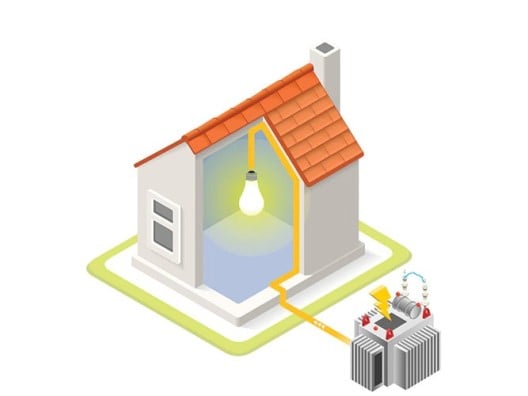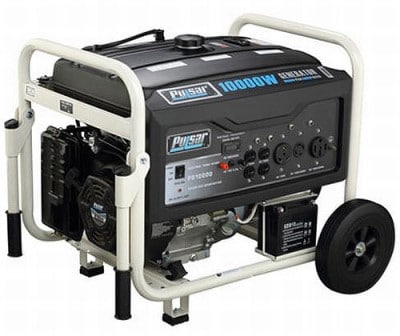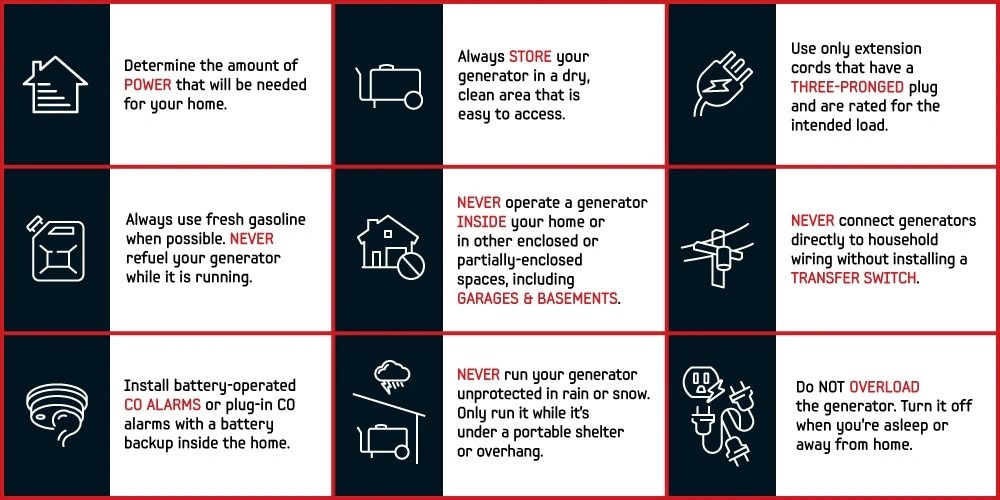Generator Safety Tips: Dos & Don'ts You Need to Know
Posted on October 12, 2025 By Alison PIf you really want to be prepared the next time the power goes out, a portable generator is the way to go! You'll have the lights back on in no time at all. Here are the dos and don'ts to operating your generator and keeping you and your family safe.
Portable Generator Safety Tips

Let's cover some safety tips that should be helpful for you as you use your portable generator.
Choose the generator that's right for you
When shopping for generators and accessories, first consider what you will be powering in your home. Will it be your lights, appliances, or other household equipment? Calculate the amount of power they require and total it up. You'll need to purchase a generator that produces more power than what will be drawn from your home's equipment. If the equipment in your home draws more power than the generator can produce, you may blow a fuse on the generator or damage the connected equipment. If you can't determine the amount of power that will be needed, ask an electrician to determine it for you.
Store your generator properly
Always store your generator in a dry, clean area that is easy to access. When the power goes out, you don't want to be tripping over things in the dark trying to get to it!
Use a ground wire
Use heavy-duty, properly-grounded extension cords to plug appliances into the generator. Without proper grounding, you could be electrocuted.
Check all cords
Make sure to check all cords that will be plugged into the generator for frays and exposed wires.
Maintain your generator
Always use fresh gasoline when possible. If a generator is likely to sit for long periods of time before being run again, use a gasoline stabilizer. You should start your generator at least once a month and let it run for a few minutes. If it has a battery, trickle charge the battery from time to time to ensure it's ready to go.
Generator Dangers

There are a few dangers associated with running your generator that you should try to avoid while using it.
Don't run your generator indoors
Never run portable generators inside your home or in your garage. Gasoline-powered generators produce carbon monoxide, and the fumes can be deadly. Keep your generator away from your home's windows and doors as well. To be on the safe side, invest in a carbon monoxide alarm with battery backup for your home; if gas from the generator has entered your home the alarm will sound to warn you.
Don't run your generator unprotected in rain or snow
In bad weather, keep your generator in a shed, under an overhang, or beneath a portable shelter if possible. It's very important to keep your generator dry when operating. Never touch a generator with wet hands, as you could be electrocuted.
Don't connect your generator directly to your home's main fuse box or circuit panel
The only recommended method to connect a generator to house wiring is by having a QUALIFIED ELECTRICIAN install a power transfer switch. Never try to do this yourself.
Don't refuel your generator while it's running
Shut off your generator first and let it cool down, as gasoline spilled on hot engine parts could ignite and start a fire.
Don't overload your generator
Use it only when necessary. Turn it off when you're asleep or away from your home to avoid a possible fire hazard.
Portable Generator Features
As important as it is to stay safe when operating a generator, you should also be looking for a generator that can match your needs, especially when generators are most often used during some kind of emergency. Though it was stated earlier how important your generator's power output is, there are a few other things that make up a quality generator.
Fuel Type
Select generators can take different types of fuel. Some models can run on both gasoline and liquid propane. During an emergency, it may be harder to find gasoline; if that happens, lean on the generator's ability to use liquid propane as a fuel source, if your model of generator has this functionality.
Push-To-Start
It's no secret that generators can be difficult to get running if you're not used to dealing with them. Many modern models come with a push-to-start button that makes starting them up really easy.
Run Time
You also need to look out for how much fuel the generator can hold, as that will determine how long it can run. If you know you're going to need to run the generator for a long time, you're going to need a generator that can handle a lot of fuel at once, and can stay on for extended period of time.
Outlets
Take note of the number of outlets the generator has built into it; this will allow you to determine if it has the capacity to run everything you need.
When using a portable generator always remember: Safety first! If you have any doubts about how to properly use your generator, contact the manufacturer or a licensed electrician for assistance.

